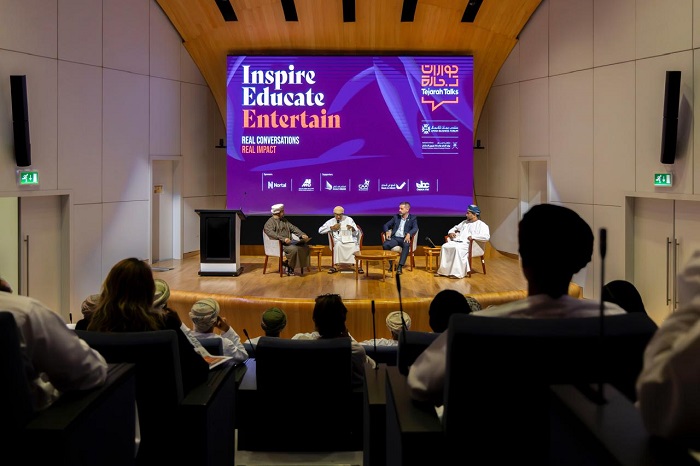
MUSCAT: A bold call to position Oman as a future host of Formula One (F1) dominated the latest Tejarah Talks on Tuesday, where top sports and events leaders outlined a compelling roadmap to unlock the country’s sports economy potential.
With global case studies, local success stories, and a shared vision for iconic sporting events, the session spotlighted how Oman can accelerate its rise as a premier destination in the $2.65 trillion global sports industry.
Oman must dream big and think bold — and that includes aiming to one day host a Formula One Grand Prix. That was the unifying message from panellists at the latest edition of Tejarah Talks, where leaders from across Oman’s sports and events sectors shared a compelling vision for the country’s sports economy.
Held under the theme “Game On: The Potential of Oman’s Sports Economy”, the 90-minute dialogue featured Pankaj Khimji, Advisor for Foreign Trade and International Cooperation at the Ministry of Commerce, Industry and Investment Promotion (MoCIIP); Joe Rafferty, Events Director at Oman Sail; and Ali al Ajmi, CEO of Sabco Sports.
All three panelists agreed: Oman should consider becoming a future host of Formula One — and start planning now.
“Oman has already proven its capabilities by hosting global events. Hosting Formula One should be a serious aspiration,” said Khimji, who also serves as Oman Cricket President.
“Whether it’s a city circuit along the Muscat Corniche, like Monaco or Jeddah, or a purpose-built track at Sultan Haitham City, the potential is there. I would love to see F1 in Oman.”
Khimji cited Oman Cricket’s achievements as a successful case study of sport-led economic development. With an investment of just $1.3 million over five years, Oman Cricket has generated more than $5 million in in-country value through hosting international tournaments — driving gains in tourism, hospitality, and infrastructure.
Highlighting the 2021 ICC T20 World Cup, partially staged in Oman, he revealed that the event attracted 167 million global viewers, clocking a staggering 112 billion viewing minutes.
In remarks to Times of Oman, Khimji added: “Oman is now among the top 20 cricket nations. We are the only Associate nation to have played in three T20 World Cups, and our Test-accredited venue is even being considered to host Afghanistan’s Test matches.”
Khimji also proposed creating an annual iconic sports event that could anchor Oman’s sporting calendar and boost international visibility.
“Just one event, hosted every year, can transform how the world sees Oman,” he said.
Ali al Ajmi shared plans to further engage the nation through technology. “Sabco Sports is set to launch the country’s first dedicated sports app that will centralise all sporting activities. It’s going to be a game-changer in how Omanis interact with sports at all levels.”
Joe Rafferty from Oman Sail stressed the importance of building a comprehensive ecosystem to support Oman’s sports economy.
“We already host world-class events. But now we need greater collaboration and a stronger infrastructure to move to the next level.”
Rafferty also pointed to Oman’s human capital as its greatest strength.
“The power of the people is Oman’s biggest asset. With the right support and coordination, we can build something truly world-class.”
The panel strongly agreed that developing a culture of sport must begin in schools.
Khimji emphasised the need to introduce a structured sports curriculum, ensuring that sport becomes an integral part of growing up in Oman.
He spoke about a pilot programme, conducted by Oman Cricket, which introduced over 700 Omani children aged 8–12 to organised cricket over four semesters — a powerful example of how early exposure can spark long-term engagement.
“We must start young, build infrastructure, and develop the mindset. Sports must be seen as a viable career and a national asset,” Khimji said.
Ajmi and Rafferty echoed this, with Rafferty adding:
“If we want to be world-class in the future, we need to embed sport in everyday life — starting with schools.”
The panellists also noted that sport can bring wide-ranging societal benefits — from reducing healthcare costs to strengthening community bonds — and called for a national strategy that integrates infrastructure, talent development, and public-private partnerships.
Organised by the Oman Business Forum in collaboration with MoCIIP, and supported by MHD, Nortal, Invest Oman Lounge, and Oman FM, the session explored not only the trillion-dollar global sports economy but how Oman’s unique landscape, and youthful population can position it as a sought-after sports destination.
At the end of an engaging session, one sentiment echoed loud and clear from panellists and the audience alike: With vision, planning and ambition, Oman can take its rightful place on the global sporting map — even as a future Formula One host.